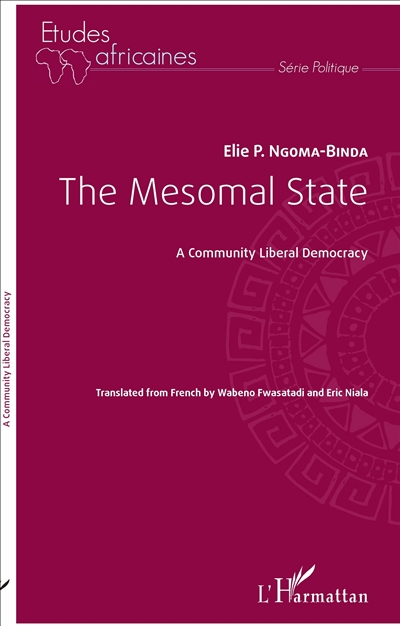en savoir plus

Carte fidélité
Permet à tous ses détenteurs d'obtenir 5% de réduction sur tous les livres lors du retrait en magasin (réduction non cumulable avec les réductions de type étudiant).
Offre également un certain nombre d'avantages auprès de nos partenaires.
Wishlist
Avec les favoris, retrouvez dans un espace les sélections effectuées au fur et à mesure de vos navigations dans le site.
Constituez pour votre usage personnel vos listes de livres en prévisions d'achats futurs et votre sélection d'articles, dossiers, événements, vidéos ou podcasts préférés ou à découvrir plus tard...
Il suffit simplement de cliquer sur "Ajout Favori" sur chaque page qui vous intéresse pour les retrouver ensuite dans votre espace personnel.
Requiert un compte Mollat
Mes Alertes
Requiert un compte Mollat
The mesomal State : a community liberal democracy
Auteur : Elie Phambu Ngoma-Binda
en savoir plus
Résumé
Une étude sur la démocratie et son développement en Afrique noire où le spécialiste explique qu'une nouvelle théorie doit être forgée, à partir du libéralisme et de la notion de communauté. ©Electre 2025
Lire la Quatrième de couverture
Réduire la Quatrième de couverture
The Mesomal State
A Community Liberal Democracy
The urgency of the democratic question in the struggle for the advancement of humankind is at the heart of this study. To establish and to develop a representative democracy, it is necessary to have a rationale free from the State regulations sufficiently liberated to place really at stake the cultural forces and spirits native to each country. Now the history of the last forty years in Black Africa proved fully that it is rather a counter-productive logic which was adopted by the elites of independences. First of all, the more or less totalitarian countries ignored the unavoidable cultural background for anyone who wants to build on something to last. Afterwards, the Colonial State model - liberal and individualistic - was reproduced almost completely with the native rulers more or less designated or « elected » from abroad (at 99%) not to say sprung violently from the military fold. Yet, the community or communitarist nature of African rural as well as urban State is undeniable. Not stopping there while one is making a reflection on the « good governance » is simply a counter intellectual economy. The burning question has proved the necessity of building a new practice of political power supported by a new theory of democracy, forged from both liberal Western political philosophy and community political thought of traditional Africa.
Elie P. Ngoma-Binda is from the DR Congo. He teaches political philosophy, African philosophy, political science and business ethics at the University of Kinshasa and abroad. A former Dean of the Faculty of Letters and Human Sciences, he studied and has brought research stays through postdoctoral Scholarships of the Alexander von Humboldt Foundation (universities of Witten-Herdecke, Hannover, Tübingen, in Germany), the International Human Rights Institute (Strasbourg, in France), the Hoover Chair for Economic and Social Ethics (University of Louvain-la-Neuve, in Belgium) and the Fulbright - Hubert H. Humphrey Program (University of Colorado at Boulder, and University of Maryland at College Park, in the USA). Founder and Director of the Institute of Political Studies (Ifep), he has published intensively in philosophy, political science and many other social sciences disciplines.
Fiche Technique
Paru le : 29/05/2017
Thématique : Sciences politiques
Auteur(s) : Auteur : Elie Phambu Ngoma-Binda
Éditeur(s) :
L'Harmattan
Collection(s) : Etudes africaines
Contributeur(s) : Traducteur : Wabeno Fwasatadi - Traducteur : Eric Niala
Série(s) : Non précisé.
ISBN : 978-2-343-12301-1
EAN13 : 9782343123011
Reliure : Broché
Pages : 180
Hauteur: 22.0 cm / Largeur 14.0 cm
Épaisseur: 1.0 cm
Poids: 224 g
